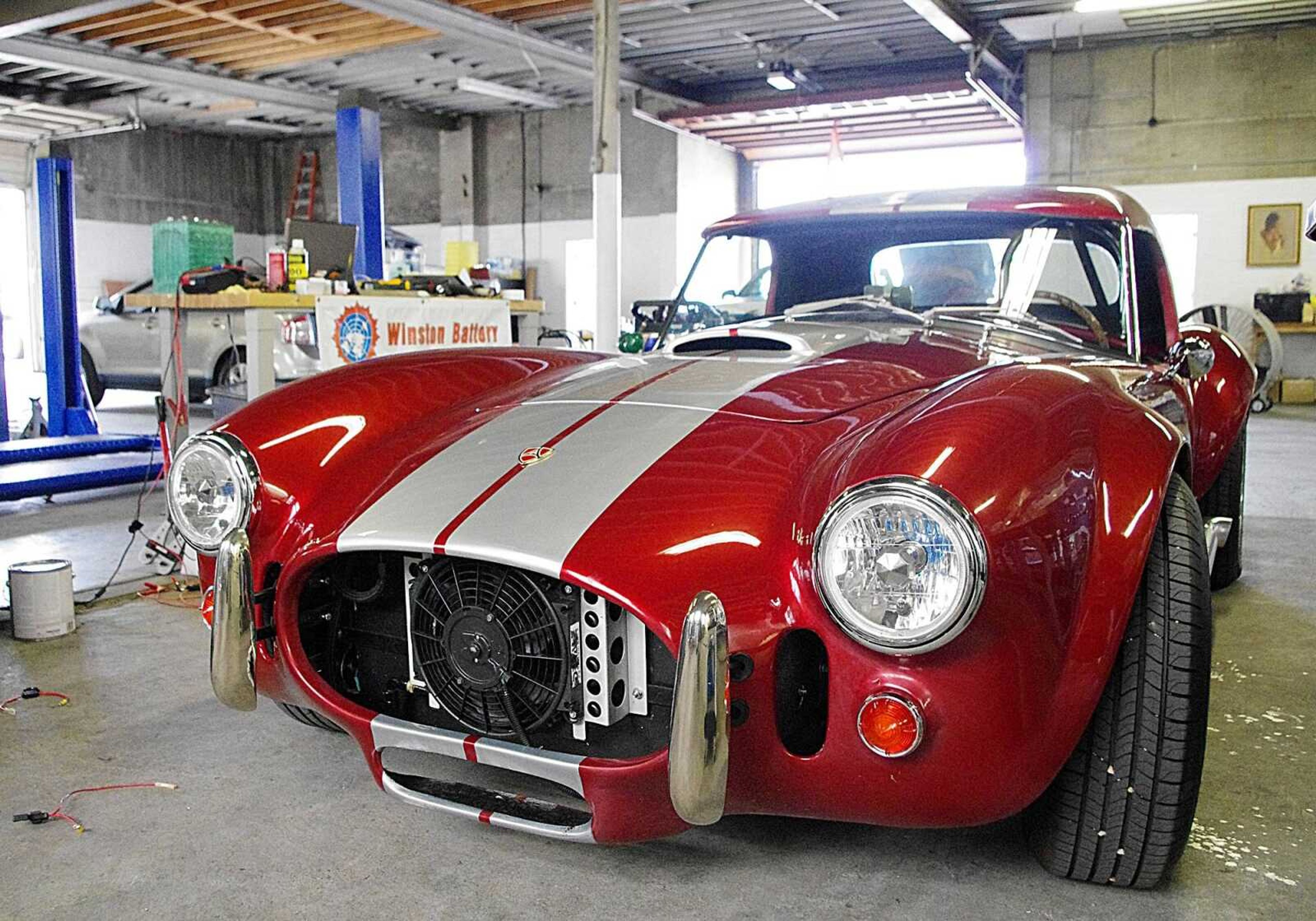Cape Girardeau garage converts cars to electric power
Jack Rickard, owner of EVTV garage in Cape Girardeau, creates electric vehicles that drive 150 miles on a charge and can reach speeds of 100 miles per hour.
With uncertainty lingering over ever-changing gas prices, it is becoming more common to see individuals taking matters of transportation into their own hands. Walking, biking and riding scooters are alternatives to multiple trips to the gas pump that are often seen in Cape Girardeau and on Southeast Missouri State University's campus.
Jack Rickard, owner of EVTV garage in Cape Girardeau, began converting gasoline-using cars into electric vehicles in 2008 with the conversion of a 1979 Ford Pinto. The Pinto got only eleven miles to a charge and had no heat. Rickard said up until that point society's only experiences with electric vehicles were elevators and golf carts.
"Electric cars were kind of like science projects," Rickard said. "Not really a car."
Rickard continued converting cars, creating electric vehicles that drive 150 miles on a charge and reach speeds of 100 miles per hour.
In his own words, Rickard is a 54-year-old man in yellow shoes who spends three months building a car that can go 100 miles per hour for 100 miles on a charge.
Gas prices continued to climb closer to $4 a gallon between 2008 and 2009. Rickard thought the choice to go electric was obvious.
Rickard explained electric cars are as fast or faster than a vehicle that uses an internal combustion engine, and when the person presses the accelerator on an electric vehicle, the vehicle keeps accelerating.
"It's an exhilarating feeling," Rickard said. "If people knew about this, everyone would want one."
With this idea in mind, Rickard, the former editor and publisher of Boardwatch Magazine began filming a web-based television show from his garage called Electronic Vehicle Television.
Rickard's first show was filmed in 2009. The choice to promote electric drive using online resources and videos was Rickard's preference, but the transition from print media to multimedia did not come easy.
"The whole process was out of my comfort zone," Rickard said. "It's been a video experiment and car experiment done simultaneously."
EVTV has between 7,000 to 10,000 weekly viewers of the approximately two-hour show around the world. EVTV episodes can be found on YouTube and on EVTV's website evtv.me.
"Google is your friend," Rickard said. "Eventually anybody interested in building an electric car finds EVTV. That's usually how it starts. You know the distance from one site to another. One click."
Rickard said 45 percent of EVTV viewers are outside the U.S. and Canada. Viewers in countries including Japan, China and the United Kingdom are used to high gas prices and have been on the electric bandwagon for a while.
Rickard and his team at the EVTV garage convert cars that Rickard purchases or cars that are given to them. In some cases, customers will send prototypes from overseas to the garage to be converted to electric power. Rickard and his team have converted cars like a 2008 Escalade and a fiberglass replica of a 1966 Shelby Cobra.
"That's our mission at EVTV," Rickard said. "To get more people to convert to electric drive. Most of these guys come to the conversion shop to convert cars to electric drive without going broke or getting started on a project they can't finish."
Converting a car to electric drive is not a cheap or quick project. Rickard said conversion projects can run anywhere from $15,000 to $20,000 and take from three to six months to complete, depending on how dedicated an individual is.
Southeast assistant director of Aquatics Chad Sierman constructed his own electric, three-wheeled vehicle called a BugE and has been driving it for a little over a year.
"It seemed ridiculous to me to drive my truck back and forth to work, which is a total of like eight miles, when all I was hauling was me," Sierman said. "I just hated seeing my money go to the pumps every month just to go back and forth to work."
Sierman estimated that he saved approximately $600 in gasoline over the past year, as well as 2,300 miles of wear and tear on his truck. The cost of one cent of electricity per mile in Sierman's BugE has paid off.
Rickard said it takes between five and seven kilowatt-hours of electricity to refine one gallon of gasoline, which is equivalent to 28 miles driven in an electric vehicle. He believes if 20 percent of the population drove 20 percent of their miles using electricity instead of gasoline, gas prices would decrease.
Last year Rickard organized an Electric Car Conversion Convention in Cape Girardeau. The convention brought together experts from the electric conversion field and individuals wishing to convert their vehicles to learn from each other's conversion techniques and experiences.
The second annual Electric Car Conversion Convention will be held from Sept. 26-30 at the Show Me Center, with specific events open to the public that will take place throughout Cape Girardeau.
The convention will include presenters from multiple countries demonstrating techniques and skills to be used when converting cars to electric power. Tickets to the convention are $595 and can be purchased at evtv.me.
An electric car drag race will take place at 4 p.m. on Sept. 28 at the Cape Girardeau Airport. This event is open to the public.
An electric car show will take place during the afternoon on Sept. 29 at Capaha Park, followed by an electric car parade from Broadway to Main Street, ending on William Street. Both events are open to the public.






